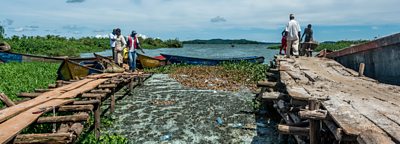Downloads
Research summary
Published: January 2021
Weather and climate information is not always easy to convey in simple terms that enable ordinary people to make important decisions for their lives and livelihoods. Our formative research conducted in 2018 showed that journalists in East Africa reported weather and climate information using technical terms, without understanding what they mean for their audiences. They did not have a good understanding of weather and climate information, and had limited interaction with weather and climate experts.
Both journalists and experts described their relationship as complex, with mutual distrust.
We found that target audiences were caught between their reliance on indigenous climate forecasting - which are perceived to be unreliable amid unpredictable weather patterns - and the scientific approach, also perceived to be unreliable as people do not understand how information is generated and predictions are made.
The project
Between 2018 and 2020, our project Weather Wise supported 10 stations to produce quality radio programming that responds to the weather and climate information needs of people in East Africa. The programmes were created to help people to take positive actions to improve their lives and livelihoods. The project trained local journalists, meteorologists and experts in agriculture, fisheries and livestock on how to communicate weather and climate information effectively, and brought them together to share learning. In this way, the journalists ere able to engage with and interview local Met offices and experts, and incorporate their expertise and advice in their weather programmes.
Key findings
Our research found that the programmes helped raise the target audiences’ knowledge and understanding of weather and climate issues. Journalists reported an increase in their interest in and understanding of weather and climate issues, such as how weather forecasting is carried out, and the scientific terminology used, and appreciated their new working relationships with meteorologists and experts.
The programme changed our lives. We did not know how to cope with changes in the weather but they gave us some good tips. For example, we did not use fertilisers before but now we do and we also space the coffee trees.’’
Engaging listeners
Our research also found that listeners tuned in and discussed content with their family, friends and others in their communities whom they thought would benefit. They said they appreciated the programmes' clear, simple and non-technical language.
- Listeners understood what climate change is and what impact it has on their lives. They listed actions they learned from the programmes which could help them improve their livelihoods. For example, fishermen said they learned the benefit of using correct fishing nets and life jackets, while pastoralists spoke about evacuating livestock and families at times of heavy rainfall and flooding.
- While all said they understood the importance of listening to the weather forecast, some still doubted its accuracy, as they struggle to understand the concept of probability in weather forecasting.
- Listeners were able to apply their learning to some extent, motivated by the need to maximise their earnings and/or prevent losses. They identified poverty as the main challenge in making choices to take action based on weather predictions.
We read out a few statements to listeners we interviewed as part of this research about various aspects of the programmes, asking them to indicate their level of agreement. 97% agreed that the topics addressed by the programme are relevant to them; 88% agreed that the information they hear on the programme is clear and easy to understand; and 76% agreed that they trust the climate and weather information on the programme (base=34).
What journalists thought
In addition to reporting increased interest in and understanding of weather and climate issues, and improved working relationships, journalists said they found the project informative and that it allowed them to overcome their mistrust. Experts also said that the project helped them work more closely and effectively with journalists, and given them more confidence in speaking to and working directly with media practitioners.
Implications
Our evaluation found that high production and editorial standards drove audiences’ interest and trust in the radio programmes. It is important that Weather Wise continues to support journalists' production and editorial standards, to ensure the weather programmes continue to be engaging and informative.
The research also revealed that audiences were motivated to follow advice given on the programmes when it was relevant to their lives, easy to replicate, or when they could see an economic benefit or an opportunity to prevent losses. Showcasing these two outcomes could further inspire audiences to take action.
Our evaluation highlighted the positive impact from having journalists and experts collaborate on the quality of the programmes. Both found the experience positive and valued its role in helping them overcome mistrust. Future projects must continue to enhance these links and collaboration.
Research methodology
Our Research & Learning team conducted this evaluation to assess both the impact of the weather programmes produced by partner stations on target audiences, and of the capacity strengthening activities.
The qualitative research consisted of in-depth interviews and focus group discussions with programme listeners, journalists and experts. Independent consultants conducted content analysis to provide objective assessments of the editorial and production quality of the weather and climate radio programming produced by the partner stations. Fieldwork took place in October and November 2020.
Find out more about the Weather Wise project here
